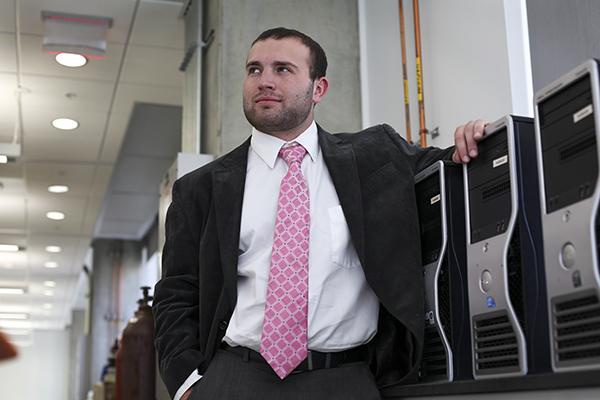Updated: April 4, 2016 at 1:35 p.m.
Last summer, a senior majoring in chemistry was clearing tables at The Cheesecake Factory. Now he will present his research at a global chemistry conference.
John-Hanson Machado became the first GW student to win the Joseph Breen Memorial Fellowship last week. The award sponsors a young chemistry scholar to participate in the 20th Annual Green Chemistry & Engineering Conference in Oregon this June.
Machado works with Jakub Kostal, a research scientist in the Computational Biology Institute, and studies computational modeling of data that researches how chemicals can seep into the human body through the skin, which is known as skin permeability. He is organizing and rating all of the data from previous studies on the topic and hopes to create reliable datasets that can be used in future studies.
“We are looking to figure out a way to curate all the information that was taken from studies dating all the way back to the ’50s and organize that in a way that is effective for modeling,” Machado said.
Machado said he has helped to create the “most comprehensive data set in skin permeation,” something the field has been missing up to this point. He said he hopes other researchers will also use the data, which he plans to publish before he graduates next month.
He said making sure data is accurate is critical to successful research – if chemists know what has already worked in studies of toxicology and skin permeability, they can reduce chemical use.
“I didn’t have a clue when I started. I just knew things needed to get done because the data was a mess,” Machado said. “By reading through all of this, I learned how it worked. I am not only a data scientist. Now I have a mechanistic explanation about why that was true.”
He said that chemicals used in labs come with environmental consequences, and to reduce the use of those chemicals, researchers use computer modeling.
The Computational Biology Institute funds Machado’s research, where he works as an undergraduate researcher and receives research credit.
“I don’t need to serve tables at The Cheesecake Factory anymore,” Machado said. “I can do what I want to do. I can do research.”
Keith Crandall, the director of the Computational Biology Institute, said in an email that the program was excited that Machado’s “effort, talent and potential” was recognized with the fellowship.
“We strive at the CBI to involve undergraduate and graduate student researchers in highly significant and impactful research,” Crandall said. “It’s wonderful to receive this sort of external validation that we are achieving this goal.”
Before the conference this summer, Machado will participate in a student workshop where students compete in teams in a green chemistry challenge. At the conference, which is the longest-running event on the topic, students, scientists and industry experts will discuss research innovation. Machado will give a presentation on the systematic evaluation of data quality that allows toxicologists to build models with reliable data.
“If you work hard, you’ll eventually get good at something that someone will want to pay you for it, someone will want you to present at an international conference,” Machado said.
This story is updated to reflect the following correction:
The Hatchet incorrectly reported that the student won the John Breen Memorial Fellowship. It is actually the Joseph Breen Memorial Fellowship. We regret this error.







